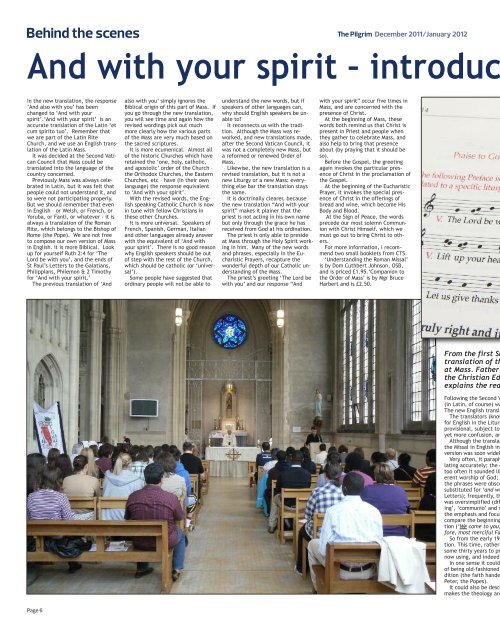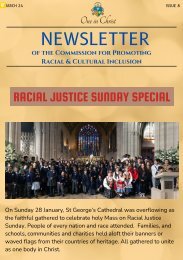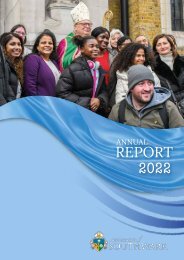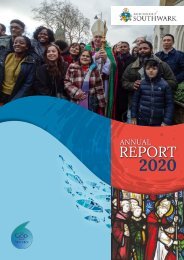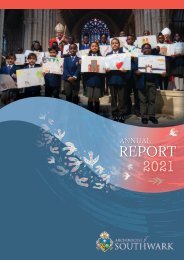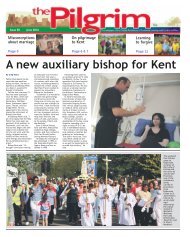Issue 01 - The Pilgrim - December 2011 - The newspaper of the Archdiocese of Southwark
The First issue (December 2011) of "The Pilgrim", the newspaper of the Archdiocese of Southwark
The First issue (December 2011) of "The Pilgrim", the newspaper of the Archdiocese of Southwark
- No tags were found...
Create successful ePaper yourself
Turn your PDF publications into a flip-book with our unique Google optimized e-Paper software.
From <strong>the</strong> first Su<br />
translation <strong>of</strong> th<br />
at Mass. Fa<strong>the</strong>r<br />
<strong>the</strong> Christian Ed<br />
explains <strong>the</strong> rea<br />
Following <strong>the</strong> Second V<br />
(in Latin, <strong>of</strong> course) wa<br />
<strong>The</strong> new English transla<br />
<strong>The</strong> translators (know<br />
for English in <strong>the</strong> Liturg<br />
provisional, subject to<br />
yet more confusion, an<br />
Although <strong>the</strong> translat<br />
<strong>the</strong> Missal in English ine<br />
version was soon widel<br />
Very <strong>of</strong>ten, it paraph<br />
lating accurately; <strong>the</strong> q<br />
too <strong>of</strong>ten it sounded lik<br />
erent worship <strong>of</strong> God;<br />
<strong>the</strong> phrases were obscu<br />
substituted for ‘and wi<br />
Letters); frequently, th<br />
was oversimplified (dif<br />
ing’, ‘communio’ and s<br />
<strong>the</strong> emphasis and focus<br />
compare <strong>the</strong> beginning<br />
tion (‘We come to you,<br />
fore, most merciful Fa<br />
So from <strong>the</strong> early 198<br />
tion. This time, ra<strong>the</strong>r<br />
some thirty years to pr<br />
now using, and indeed<br />
In one sense it could<br />
<strong>of</strong> being old-fashioned,<br />
dition (<strong>the</strong> faith hande<br />
Peter, <strong>the</strong> Popes).<br />
It could also be desc<br />
makes <strong>the</strong> <strong>the</strong>ology an<br />
Behind <strong>the</strong> scenes <strong>The</strong> <strong>Pilgrim</strong> <strong>December</strong> 2<strong>01</strong>1/January 2<strong>01</strong>2<br />
And with your spirit – introduc<br />
In <strong>the</strong> new translation, <strong>the</strong> response<br />
‘And also with you’ has been<br />
changed to ‘And with your<br />
spirit’.‘And with your spirit’ is an<br />
accurate translation <strong>of</strong> <strong>the</strong> Latin ‘et<br />
cum spirito tuo’. Remember that<br />
we are part <strong>of</strong> <strong>the</strong> Latin Rite<br />
Church, and we use an English translation<br />
<strong>of</strong> <strong>the</strong> Latin Mass.<br />
It was decided at <strong>the</strong> Second Vatican<br />
Council that Mass could be<br />
translated into <strong>the</strong> language <strong>of</strong> <strong>the</strong><br />
country concerned.<br />
Previously Mass was always celebrated<br />
in Latin, but it was felt that<br />
people could not understand it, and<br />
so were not participating properly.<br />
But we should remember that even<br />
in English – or Welsh, or French, or<br />
Yoruba, or Fanti, or whatever - it is<br />
always a translation <strong>of</strong> <strong>the</strong> Roman<br />
Rite, which belongs to <strong>the</strong> Bishop <strong>of</strong><br />
Rome (<strong>the</strong> Pope). We are not free<br />
to compose our own version <strong>of</strong> Mass<br />
in English. It is more Biblical. Look<br />
up for yourself Ruth 2:4 for ‘<strong>The</strong><br />
Lord be with you’, and <strong>the</strong> ends <strong>of</strong><br />
St Paul’s Letters to <strong>the</strong> Galatians,<br />
Philippians, Philemon & 2 Timothy<br />
for ‘And with your spirit.’<br />
<strong>The</strong> previous translation <strong>of</strong> ‘And<br />
also with you’ simply ignores <strong>the</strong><br />
Biblical origin <strong>of</strong> this part <strong>of</strong> Mass. If<br />
you go through <strong>the</strong> new translation,<br />
you will see time and again how <strong>the</strong><br />
revised wordings pick out much<br />
more clearly how <strong>the</strong> various parts<br />
<strong>of</strong> <strong>the</strong> Mass are very much based on<br />
<strong>the</strong> sacred scriptures.<br />
It is more ecumenical. Almost all<br />
<strong>of</strong> <strong>the</strong> historic Churches which have<br />
retained <strong>the</strong> ‘one, holy, catholic,<br />
and apostolic’ order <strong>of</strong> <strong>the</strong> Church –<br />
<strong>the</strong> Orthodox Churches, <strong>the</strong> Eastern<br />
Churches, etc – have (in <strong>the</strong>ir own<br />
language) <strong>the</strong> response equivalent<br />
to ‘And with your spirit’.<br />
With <strong>the</strong> revised words, <strong>the</strong> English<br />
speaking Catholic Church is now<br />
in tune with fellow Christians in<br />
<strong>the</strong>se o<strong>the</strong>r Churches.<br />
It is more universal. Speakers <strong>of</strong><br />
French, Spanish, German, Italian<br />
and o<strong>the</strong>r languages already answer<br />
with <strong>the</strong> equivalent <strong>of</strong> ‘And with<br />
your spirit’. <strong>The</strong>re is no good reason<br />
why English speakers should be out<br />
<strong>of</strong> step with <strong>the</strong> rest <strong>of</strong> <strong>the</strong> Church,<br />
which should be catholic (or ‘universal’).<br />
Some people have suggested that<br />
ordinary people will not be able to<br />
understand <strong>the</strong> new words, but if<br />
speakers <strong>of</strong> o<strong>the</strong>r languages can,<br />
why should English speakers be unable<br />
to<br />
It reconnects us with <strong>the</strong> tradition.<br />
Although <strong>the</strong> Mass was reworked,<br />
and new translations made,<br />
after <strong>the</strong> Second Vatican Council, it<br />
was not a completely new Mass, but<br />
a reformed or renewed Order <strong>of</strong><br />
Mass.<br />
Likewise, <strong>the</strong> new translation is a<br />
revised translation, but it is not a<br />
new Liturgy or a new Mass: everything<br />
else bar <strong>the</strong> translation stays<br />
<strong>the</strong> same.<br />
It is doctrinally clearer, because<br />
<strong>the</strong> new translation “And with your<br />
spirit” makes it plainer that <strong>the</strong><br />
priest is not acting in his own name<br />
but only through <strong>the</strong> grace he has<br />
received from God at his ordination.<br />
<strong>The</strong> priest is only able to preside<br />
at Mass through <strong>the</strong> Holy Spirit working<br />
in him. Many <strong>of</strong> <strong>the</strong> new words<br />
and phrases, especially in <strong>the</strong> Eucharistic<br />
Prayers, recapture <strong>the</strong><br />
wonderful depth <strong>of</strong> our Catholic understanding<br />
<strong>of</strong> <strong>the</strong> Mass.<br />
<strong>The</strong> priest’s greeting ‘<strong>The</strong> Lord be<br />
with you’ and our response “And<br />
with your spirit” occur five times in<br />
Mass, and are concerned with <strong>the</strong><br />
presence <strong>of</strong> Christ.<br />
At <strong>the</strong> beginning <strong>of</strong> Mass, <strong>the</strong>se<br />
words both remind us that Christ is<br />
present in Priest and people when<br />
<strong>the</strong>y ga<strong>the</strong>r to celebrate Mass, and<br />
also help to bring that presence<br />
about (by praying that it should be<br />
so).<br />
Before <strong>the</strong> Gospel, <strong>the</strong> greeting<br />
again invokes <strong>the</strong> particular presence<br />
<strong>of</strong> Christ in <strong>the</strong> proclamation <strong>of</strong><br />
<strong>the</strong> Gospel.<br />
At <strong>the</strong> beginning <strong>of</strong> <strong>the</strong> Eucharistic<br />
Prayer, it invokes <strong>the</strong> special presence<br />
<strong>of</strong> Christ in <strong>the</strong> <strong>of</strong>ferings <strong>of</strong><br />
bread and wine, which become His<br />
Body and Blood.<br />
At <strong>the</strong> Sign <strong>of</strong> Peace, <strong>the</strong> words<br />
precede our most solemn Communion<br />
with Christ Himself. which we<br />
must go out to bring Christ to o<strong>the</strong>rs.<br />
For more information, I recommend<br />
two small booklets from CTS.<br />
‘Understanding <strong>the</strong> Roman Missal’<br />
is by Dom Cuthbert Johnson, OSB,<br />
and is priced £1.95.‘Companion to<br />
<strong>the</strong> Order <strong>of</strong> Mass’ is by Mgr Bruce<br />
Harbert and is £2.50.<br />
Page 6


